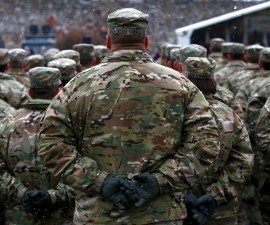(单词翻译:单击)
ALISON STEWART, PBS NEWSHOUR WEEKEND ANCHOR: To discuss the security situation in Europe, I am joined from Warsaw by Paul Jones, the American ambassador to Poland. He's a career foreign service officer appointed by President Obama in 2015 and is staying on with the Trump administration.
Ambassador, what is your reaction to the Kremlin calling Operation Atlantic Resolve a provocation and, quote, "a threat"?
PAUL JONES, U.S. AMBASSADOR TO POLAND: Well, Alison, you know, these decisions have been taken over a course of time, and especially after Russian's invasion of Ukraine and its occupation of Ukrainian territory, which led to a deterioration of the security environment here, and a lot of anxiety from some of our allies.
And so, our military together with our allied militaries took some prudent, took — made some prudent recommendations to political leadership. And that includes this deployment of a U.S. armored brigade combat team first to Poland and then to the region.
STEWART: Ambassador, why commit troops specifically to Poland?
JONES: Well, Poland is really the hub of this deployment. So, these forces, about 3,500, 4,000 soldiers with heavy armor will — are deploying from Poland because of Poland's geographic location. And they will be headquartered here in Poland. But they will also be in the Baltic States. They'll be in Hungary, they'll be in Romania and Bulgaria. All of those countries have requested this support.

STEWART: Will other NATO members bordering Russia add deterrent forces?
JONES: You know, this is a bilateral deployment, this particular deployment that is happening right now. Later in the spring, we will have the NATO contingents come in, a U.S. battalion will come to Poland, British, German and Canadian battalions will go to the Baltic countries, but this is really supported by all 28 allies one way or the other. And even within this region, Poland, for example, is contributing to the security of other countries along this side of NATO because it's the largest country and the one with the most capable military itself.
STEWART: We have a new president in the United States, one who has questioned the United States role within NATO. Is there any concern there that the U.S. troops will be asked to come home — to return home by the Trump administration?
JONES: Well, I think the government and the president of Poland are looking forward to having a detailed — there's been some contact already. But they're looking forward to having a detailed conversation about the security in this region and about how the United States and Poland — I mean, Poland sees the United States as its, you know, primary strategic ally. But the whole alliance can ensure security in this region.
STEWART: One of Mr. Trump's criticisms of NATO is that all the member nations are supposed to devote 2 percent to their GDP to defense. Only five nations do that. The United States and Poland being two of the five.
Is it — is there anything that you and other diplomats can do to create more equity in that situation? And does it ever cause tensions between the member nations?
JONES: You know, as you say, Poland is contributing its 2 percent and actually is involved in a broader military modernization program, which includes very significant purchases of military equipment, and weaponry from the United States as part of that. So — but I think you see over all, a growing sense within the alliance that we have to pick up the pace of every ally reaching that 2 percent and every ally contributing.
And we see that, really, in what's happening in this part of the alliance. And as I say, Poland is a big contributor to that and frankly, you know, wants to be part of not only the contributions militarily but the policy discussion going forward in — you know, with the new administration in Washington and also in the future meetings of the alliance.
STEWART: Ambassador Paul Jones from Warsaw, Poland — thank you for being with us.
JONES: Thank you. It's been a pleasure, Alison.


